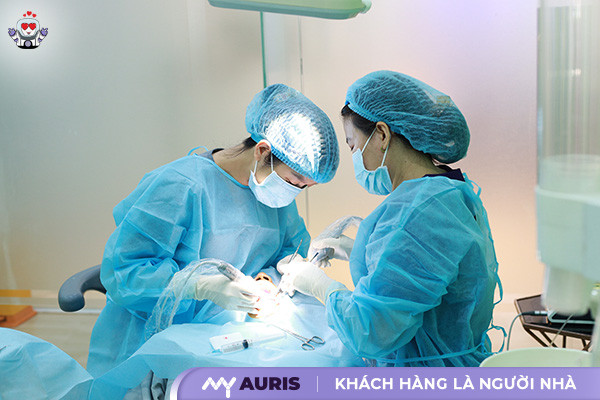Is tooth grinding painful? This is a common question when undergoing aesthetic dental treatments. So, is grinding teeth for porcelain crowns painful? Let’s find out with My Auris!
What is Tooth Grinding?
Tooth grinding is a dental technique that uses a grinding tool to reduce the size of a tooth according to a specific ratio, removing some enamel before capping it with a porcelain crown to effectively and safely protect the tooth.

When Should You Grind Your Teeth?
Tooth preparation (grinding) is a dental technique indicated in various cases to adjust tooth shape to standard proportions and protect the natural tooth. Below are common situations where it is necessary:

Cosmetic Porcelain Crowns
In cases of spaced teeth, misaligned teeth, chipped teeth, cracked teeth, fractured teeth, discolored teeth, or severe tooth decay leading to pulpitis, the dentist will grind the tooth down to a suitable proportion for restoration with porcelain, ensuring both aesthetics and protection of the natural tooth from external impacts.

Porcelain Veneers
The porcelain veneer technique is typically applied to gapped teeth, cracked teeth, discolored teeth, or teeth with irregular shapes. Unlike porcelain crowns, this method only involves grinding a very thin layer on the outer surface or no grinding at all, maximizing the preservation of original tooth tissue while achieving high aesthetic results.
Improve Unbalanced Tooth Shape
When teeth have uneven shapes, such as overly long teeth, vertically cracked teeth, or misaligned teeth, grinding helps rebalance the structure, bringing harmony to the dental arch. However, for tooth grinding without a crown, a specific grinding ratio must be ensured to avoid affecting the tooth pulp and maintain long-term oral health.
Porcelain Dental Bridge
In cases of fixed tooth restoration using a porcelain dental bridge, the dentist will grind down the two adjacent abutment teeth to create space for attaching the porcelain crown, thereby supporting the missing tooth in the middle. This method helps restore the shape of the lost tooth naturally and securely.
When Should You NOT Grind Your Teeth?
Although tooth grinding can improve aesthetics and support certain dental techniques, it should not be performed in the following cases due to the risk of tooth damage and long-term impact on oral health:
Weak teeth: If teeth are ground when they are already weak, there is a high probability of fracturing the natural tooth, potentially damaging the gums and reducing the natural lifespan of the tooth.
Severe overbite, underbite, or severe misalignment: These cases often require extensive tooth grinding. If not done precisely, it can easily damage the structure of the natural tooth, leading to fractures or permanent tooth loss.
Is Tooth Grinding Painful?
You can be completely assured when undergoing tooth grinding, as this technique does not cause pain, sensitivity, or discomfort as many people might think.
Local anesthesia is a mandatory step before grinding. The dentist will use an adequate amount of anesthetic to ensure that you do not feel any pain or discomfort throughout the procedure.
Furthermore, modern dentistry now uses advanced grinding equipment with high speed and precision, which helps minimize invasiveness and prevent damage to teeth and gums. As a result, the procedure is faster, and sensitivity is significantly reduced compared to older grinding tools.
However, because you need to keep your mouth wide open for a certain period, you might feel jaw fatigue. If you feel uncomfortable, you can signal the dentist to take a 5–10 minute break to relax your jaw muscles.

Is Grinding Teeth for Porcelain Crowns Painful?
Many people, upon hearing about grinding teeth for porcelain crowns, often worry that the process will cause pain or tooth sensitivity. However, thanks to advanced technology and standard grinding methods, discomfort is almost non-existent.
Specifically, before grinding teeth for porcelain crowns, the dentist will administer a sufficient amount of local anesthetic, ensuring the patient’s comfort throughout the procedure. At the same time, thanks to the use of modern tooth grinding equipment with high speed and precision, the procedure is fast, non-invasive, causes no gum damage, and minimizes sensitivity compared to older equipment.
Although pain or sensitivity during tooth grinding rarely occurs, patients might feel jaw fatigue due to keeping their mouth open for an extended period. In such cases, you should signal for a 5-10 minute break during the grinding process.
From a professional standpoint, if performed correctly, grinding teeth for porcelain crowns does not affect tooth health, lifespan, or chewing function. The dentist only grinds a thin layer of enamel, from 0.5 – 1.5mm, to reshape the tooth structure (abutment) to support the new porcelain crown. This porcelain crown then protects the natural tooth (prepared abutment) from external impacts.
In cases where the patient has severe tooth decay extending to the pulp, the dentist will perform root canal treatment before grinding, helping to preserve the long-term lifespan of the tooth after restoration.
Are There Any Side Effects of Tooth Grinding?
Grinding teeth for porcelain crowns can cause pain if the following situations occur:
An inexperienced dentist may grind too deeply, damaging the dentin and affecting the tooth pulp, causing prolonged sensitivity or pain. Therefore, it is essential to choose a reputable dental clinic with skilled dentists and modern equipment.
Outdated equipment or the use of low-quality grinding machines can lead to high friction between the drill and tooth tissue, easily affecting the pulp and causing pain.
To avoid undesirable effects from tooth grinding, choose a reputable dental clinic with highly skilled dentists and modern, standard-compliant equipment.
Important Notes When Grinding Teeth for Porcelain Crowns to Avoid Prolonged Sensitivity
If tooth grinding for porcelain crowns is not performed correctly, it can lead to complications such as prolonged tooth sensitivity and pain. Therefore, before the procedure, patients need to remember the following:
Do not unilaterally decide on porcelain crowns. Individuals with sensitive teeth are prone to weakened teeth and sensitivity if the grinding is not performed correctly. Therefore, consult a dentist and only proceed after a thorough assessment by a qualified professional.
Prioritize selecting a reputable, high-quality dental clinic with a team of highly skilled dentists and modern supporting equipment. This helps minimize risks and enhance the effectiveness of the restoration.
After tooth grinding, maintain a scientific diet. Limit hard, chewy, cold, acidic, and spicy foods to avoid irritating the teeth. Instead, incorporate foods such as green vegetables, fruits, fish, eggs, and yogurt to enhance oral health.
Practice proper oral hygiene as instructed by your dentist. Additionally, schedule regular dental check-ups every 6 months to monitor the condition of your porcelain crowns and detect any issues early.
By understanding the causes of sensitivity and adhering to proper methods for reducing it, patients will have the opportunity to achieve strong, durable, and aesthetically pleasing porcelain teeth. Always prioritize oral care and choose the right dental clinic from the outset to ensure peace of mind throughout the treatment process.





